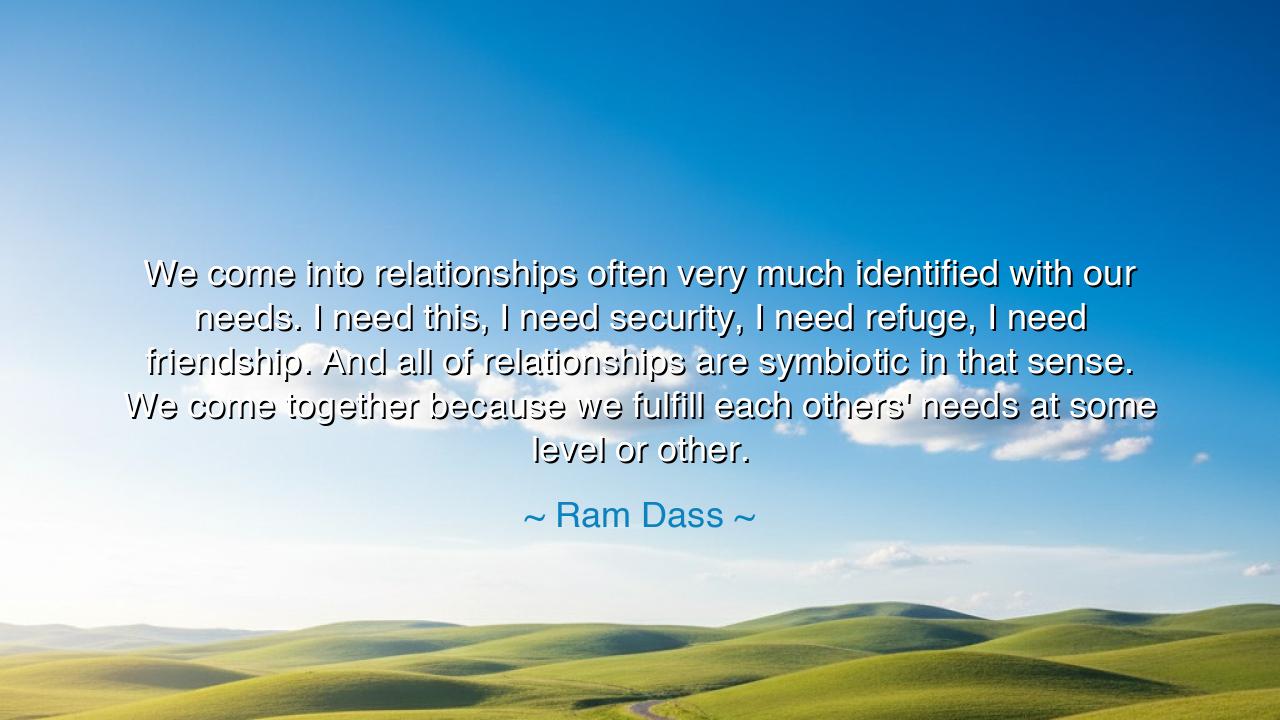
We come into relationships often very much identified with our
We come into relationships often very much identified with our needs. I need this, I need security, I need refuge, I need friendship. And all of relationships are symbiotic in that sense. We come together because we fulfill each others' needs at some level or other.






"We come into relationships often very much identified with our needs. I need this, I need security, I need refuge, I need friendship. And all of relationships are symbiotic in that sense. We come together because we fulfill each other's needs at some level or other." These profound words from Ram Dass invite us to look deeply into the nature of relationships—not merely as the union of two people, but as a complex dance of mutual fulfillment. At the heart of every human connection is a recognition of need—our desire for security, belonging, and companionship. We enter relationships seeking not only to give but also to receive, acknowledging that our deepest vulnerabilities and desires shape the very way we connect with others. This symbiotic nature of relationships, as Ram Dass describes, speaks to the way we come together to fulfill one another’s needs, whether those needs are emotional, physical, or spiritual.
In the ancient world, the concept of symbiosis was not always framed as a mutual exchange of needs, but the philosophers understood the deep interdependence of human beings. Aristotle, in his Nicomachean Ethics, wrote about friendship as a relationship founded on virtue, one that transcends the mere satisfaction of desires. He believed that friendship based on goodness and mutual respect was the highest form of relationship, and that such friendships were vital for the flourishing of the individual and society. However, Aristotle also understood that, at its foundation, friendship—and all human connection—requires some level of mutual need, for people do not form bonds without some sense of shared purpose or fulfillment.
Consider the relationship between David and Jonathan in the Bible, whose bond was forged in the fires of mutual respect and a shared sense of purpose. Both men were drawn together by their common vision of goodness, loyalty, and faith. But beyond this, their relationship also met their emotional needs—Jonathan gave David refuge from his father, King Saul, while David provided Jonathan with the courage to stand firm in his own values, even when his father’s reign was in jeopardy. Their bond was symbiotic, fulfilling both their external needs for safety and internal needs for companionship. While their relationship was grounded in virtue, it was also deeply intertwined with their personal needs for trust and loyalty, demonstrating the complexity of human connections.
In the life of Socrates, we see a similar dynamic of mutual need in his relationships with his disciples, especially Plato. Socrates’ need for intellectual companionship and the pursuit of truth drew him to engage with others in deep, philosophical conversation. Plato, in turn, needed guidance and the wisdom of his teacher. Through this symbiotic exchange, both men’s understanding of truth and virtue deepened. Socrates could not have fulfilled his purpose without the engagement of his disciples, and Plato would not have developed the philosophical insights that shaped Western thought without Socrates’s mentorship. Their relationship was not only one of teaching and learning but also a mutual fulfillment of needs—the need for wisdom, guidance, and the pursuit of moral excellence.
In the world today, we see how these principles of need and symbiosis play out in our own relationships. Whether in romantic relationships, friendships, or even professional partnerships, we enter into connections with others because we see them as fulfilling a particular need we have—whether that need is for emotional support, security, love, or even shared ambition. Ram Dass highlights the human condition: we are not isolated beings but interconnected, drawn together by our needs, and in doing so, we help fulfill the needs of others as well. It is in this mutual exchange that relationships are formed, nurtured, and sustained.
The lesson here, then, is one of awareness and honesty. To truly understand and appreciate the relationships in our lives, we must first recognize the needs we bring to them. Whether it is the need for security, companionship, or growth, acknowledging what we are seeking—and what we are giving—is essential to the health of the connection. Furthermore, by being conscious of the needs of others, we can contribute to fulfilling their desires as well, creating relationships that are not merely transactional but truly nurturing. This mutual respect and understanding of our shared human needs leads to the most profound and meaningful bonds.
In our own lives, we must strive to cultivate relationships where our needs are recognized, but where we also give space for the needs of others. We must be aware of the symbiotic nature of human connection, understanding that we are not solitary creatures but part of a web of interdependent relationships. Let us strive for balance—where we honor our own needs and the needs of others, creating bonds that nourish us all. Through this, we come to embody the truth that Ram Dass speaks of, creating a world where our relationships are both fulfilling and deeply transformative.






AAdministratorAdministrator
Welcome, honored guests. Please leave a comment, we will respond soon